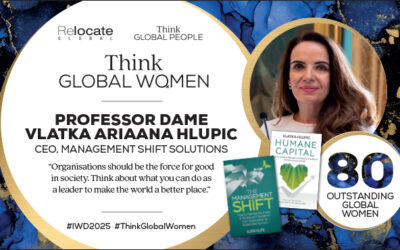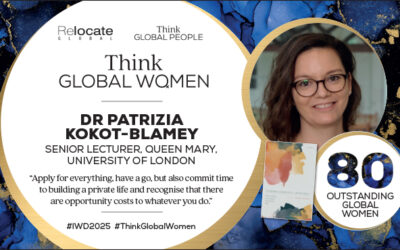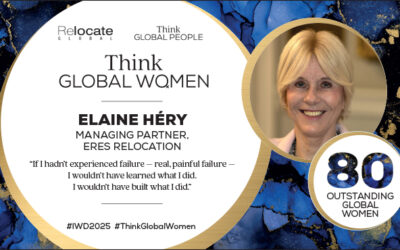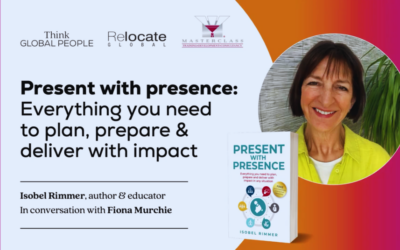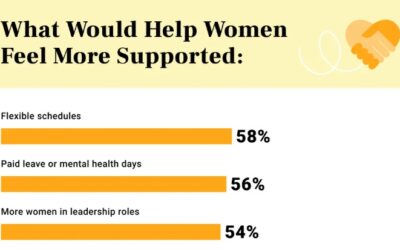Think Women
Gill Gordon | 80 Outstanding Global Women 2025

With a career spanning multiple continents and industries, forging alliances and working with trade unions and governments, Gill Gordon’s journey has been one of collaboration, negotiation and teamwork. From Paris to Berlin to the United States, each experience has shaped her leadership approach and fuelled her passion for driving change.
Gill spent most of her career with Schlumberger (now SLB) and was HR Director UK September 2014 until her retirement in October 2020. Since 2020 she has continued to be chair of the Permits Foundation, a role she first took on in 2007, a not-for-profit organisation established to persuade Governments to remove work permit barriers for the partners of highly skilled mobile employees in order to facilitate global dual careers.
Over the years, she has played a pivotal role in expanding best practices for dual career couples across more than 40 countries via the work of the Permits Foundation. However, she acknowledges that hard-won agreements need to be defended when new political leaders take over. The hard work has paid off – twenty plus years ago at Schlumberger International, dual career couples were the exception, but today there are thousands, and the number is rising rapidly across most international organisations.
“Having someone you trust, who you can talk to openly about your concerns and challenges, can make all the difference. I strongly encourage both men and women to become mentors to young people where they can, so that we can see diversity in the workforce continue to grow.”
Gill Gordon
A curiosity to see the world
Gill grew up in Bangor, Northern Ireland, about 12 miles outside Belfast. From an early age, she had a restless curiosity about the world beyond.
“My parents would probably tell you that I had a habit of wandering off as a very young child—there were a couple of “escapes” that required bringing me back home, once by the police!” she explains. “A close family friend, who travelled extensively (which was unusual at the time), used to return from her trips with tiny decorative bottles for the cocktail cabinet. I was completely fascinated by the idea of seeing different places.”
Another major influence was growing up during the worst of the Troubles in Northern Ireland and the limitations that placed on people. That played a large part in Gill’s decision to move abroad to study and work.
“Languages were my strongest subject, and they offered an obvious gateway to travel. At 16, I took my first real trip abroad—what was meant to be a short youth-hostelling trip to Normandy with a cousin. We ended up hitchhiking around France and Germany for two months instead. My poor mother was beside herself. I would send postcards and occasionally phone from a phone box, but she later admitted that she seriously considered hiring a helicopter to come and find me,” Gill says.
That trip confirmed Gill’s love for exploring different cultures. She went on to study modern languages, specifically French and German at Heriot-Watt University in Edinburgh, with a focus on interpreting and translation. As part of the programme, she spent six months in Heidelberg and six months in Geneva. Gill found she loved it, and worked every summer in France, Germany, or Switzerland, making the most of every opportunity to immerse herself in different environments.
Straight out of university, Gill joined Ford Motor Company in industrial relations. The industrial climate at the time was tough—strikes, disputes, and challenging negotiations were the norm.
“I went into it determined to build bridges—to create better dialogue between management and employees, and to foster a more positive working environment. That goal has stayed with me throughout my career,” she says.
The advent of diversity and inclusion
After five years at Ford, she moved to Schlumberger (SLB), a far more global company, where she was able to move into HR roles that took her across Europe and the United States. Over the years, she was involved in everything from talent recruitment and development, large acquisitions and divestitures, and major reorganisations, to complex negotiations with trade unions. Some of the hardest moments came when handling layoffs—sometimes in the hundreds or thousands. But she was determined to ensure the process was done in the best possible way—with transparency, respect, and support. Global mobility and interacting with people of many nationalities was part of every role she did in SLB and was something she loved.
During her career she has been HR Director for the global seismic business, WesternGeco, Director Executive Compensation for Schlumberger, and HR Director for the global R&D population. She played a key role in setting up and developing a shared services organisation for the HR function in Europe, Caspian and Africa and was also HR Director for a global electricity and gas utilities business.
“Schlumberger was also a very technical company, and when I joined, it wasn’t as diverse as it is today,” she says. “Then in the early 1990s, Schlumberger’s visionary CEO decided to take real action on diversity—both in terms of nationality and gender. A task force was set up, made up of board members and senior executives, to develop recommendations. I was asked to support them, gathering data and helping to shape an action plan.
“At a management meeting in Atlanta in 1994, the plan was presented and approved. That was the real start of a concerted effort to increase gender diversity, with recruitment goals, development programmes, and tracking of retention rates. The momentum continued, and by the early 2000s, I was leading initiatives to support dual-career families.”
In 2000, while based in Paris, Gill became president of a not-for-profit organisation, Partnerjob.com, which had been set up by Schlumberger and other companies in Paris to help find employment for the partners of relocated employees—who were, at that time, mostly women.
“We soon realised that finding jobs wasn’t enough, and that work permits were often the real barrier,” Gill explains. “Even if someone had an offer, if they couldn’t get a permit, they couldn’t work.
“At that point, I got a call from Kathleen Van der Wilk at Shell, who was dealing with similar challenges. She invited me to The Hague for a meeting with other companies experiencing the same struggles. That led to the creation of the Permits Foundation in 2001, which I joined as one of the founding board members. The goal was clear: to persuade governments to enable work permits for the partners of highly skilled mobile employees.”
Over the past two decades, the Permits Foundation has evolved, and while in the beginning it focused solely on spouses, it now advocates for married and unmarried partners, same-sex couples, and working-age children—typically up to 21—who want to move with the family.
Why dual career support is a business imperative
“For global mobility to truly work, it has to be about the whole family, not just the
employee,” Gill says. The journey has been both challenging and rewarding, but what has remained constant is
the drive to break down barriers—whether cultural, structural, or bureaucratic—to create
more opportunities for people to thrive. “Our first big success was in the United States, and it was a real turning point. At the time,we were working with a couple of employer organisations there when we heard about an
immigration bill making its way through Congress. One clause in particular caught our
attention—it was going to allow the spouses of L1 visa holders (intra-company transfers) to
work in the U.S. for the duration of the assignment. However, there was a catch: a
reciprocity clause.”
That meant the US would only grant work rights to spouses if their home country allowed
American spouses to work in return. “The moment we saw that, we knew it was going to be a logistical nightmare. Dual-career couples often come from different nationalities, and with so many potential country
pairings, this was going to create serious complications.”
After government discussions, the clause was removed, and in 2001, the bill was passed.
That was a huge win for the employer organisations collaborating to drive this change,
including Permits FoundationGill and her board members. Before that, only fourfive
countries— the UK, Canada, Netherlands, Australia, and New Zealand Denmark—automatically allowed partners to work. From that first breakthrough in the US, the Permits Foundation has spent the last two decades expanding those rights.
Today, that number has grown to around 40 countries. The EU Journey towards more open working rights
In terms of Europe, Gill and her the Permits’ team originally tackled the issue country by
country. For example, with Shell and Unilever (both founding board members), they made
further progress in the Netherlands, and in France by leveraging relationships that
Schlumberger had with key decision-makers and government.
“As we expanded across Europe, it quickly became clear that going one country at a time
was going to be too slow. That is when Kathleen and I decided to head to Brussels. We
managed to secure a meeting with the head of the Social Directorate, and he immediately
understood the issue—he was part of a dual-career couple himself. That personal
connection made all the difference. Through him, we got a critical introduction into the EU
system.”
From there, the Permits Foundation Team carried out intensive work in Brussels spanning a
number of years, directly resulting in two major wins: the Blue Card and the Inter-Company
Transfer (ICT) visa, both of which included provisions allowing partners to work legally. In
2024, the Irish Parliament adopted the ICT visa provisions—another milestone moment as
that meant that all EU countries had now done so.
“It has been a long journey, and nothing happens overnight, but seeing real change take
effect makes it all worth it,” she says.
The power of influence
Relationships, influence, and persuasion are at the core of Gill’s success. Changing minds—especially in government—requires a deep understanding of where people are coming from and what their concerns are.
The same logic applies to companies. If they want to attract and retain the best people, they need to consider the whole family’s experience. The number one reason international assignments fail is because the partner can’t work. If they feel isolated, undervalued, or unable to continue their career, the chances of an assignment being cut short—or never happening at all—go up dramatically.
“That’s why we don’t just focus on new policy wins—we also fight to protect the rights we’ve already secured,” she says. “Political environments shift. We’ve seen it in the US, the UK, and elsewhere. Governments sometimes try to roll back policies that took years to put in place. A big part of our role is making sure those doors stay open.”
Looking to the future of dual career permits
Right now, the US is still the number one priority. There are several visa types where partner work rights aren’t automatic and fixing that is a top concern for many of the companies Gill works with. Beyond that, Permits Foundation is also focused on South Africa, Singapore, India, and Japan—countries where change could have a major impact.
There will also be opportunities as multinational companies pivot to different markets. Right now, we are working in Costa Rica to propose family friendly policy that would help
meet government goals of increased foreign direct investment.
“Another emerging issue is hybrid and remote work. With more people working remotely, there’s potential for partners to keep their jobs even when they relocate. But legal frameworks around remote work visas are still evolving, and that’s an area we’re keeping a close eye on.”
Supporting women in global careers
“I always encourage women to be ambitious and not to be discouraged by obstacles,” Gill says. “While balancing career, family, and mobility can be tough, we are seeing more women rise to top leadership positions in STEM, business, and government. A couple of my former colleagues have gone on to become CEOs of major companies, which is incredible.”
One of the most important things we can do to help young women advance in their careers is to encourage them—to help them build confidence and push themselves beyond what feels comfortable, Gill says.
“Mentorship plays a huge role in this. Having someone you trust, who you can talk to openly about your concerns and challenges, can make all the difference. I strongly advise both men and women to become mentors to young people where they can, so that we can help diverse talent in the workforce to grow. We can make a huge contribution to building bridges in society by giving young people the opportunity to
experience and enjoy working in diverse teams – be that nationality, gender, religion or anything else.”





